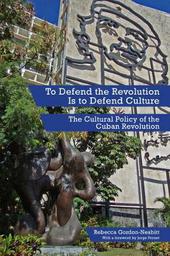
|
To Defend The Revolution Is To Defend Culture: The Cultural Policy of the Cuban Revolution
Paperback / softback
Main Details
| Title |
To Defend The Revolution Is To Defend Culture: The Cultural Policy of the Cuban Revolution
|
| Authors and Contributors |
By (author) Rebecca Gordon-Nesbitt
|
|
Foreword by Jorge Fornet
|
| Physical Properties |
| Format:Paperback / softback | | Pages:402 | | Dimensions(mm): Height 229,Width 152 |
|
| Category/Genre | History |
|---|
| ISBN/Barcode |
9781629631042
|
| Classifications | Dewey:306.47097291 |
|---|
| Audience | |
|---|
|
Publishing Details |
| Publisher |
PM Press
|
| Imprint |
PM Press
|
| Publication Date |
22 October 2015 |
| Publication Country |
United States
|
Description
A documentation of how artists, writers, and the people of Cuba contributed to the 1959 Revolution. Deploying micro and macro perspectives, it introduces all the main protagonists to the debate and follows the polemical twists and turns that ensued in the volatile atmosphere of the 1960s and '70s. The picture that emerges is of a struggle for cultural dominance between Soviet-derived approaches and a uniquely Cuban response to culture under socialism.
Author Biography
Rebecca Gordon-Nesbitt is a writer and researcher dedicated to exploring the politico-economic conditions underwriting artistic practice. Her work has been extensively published in anthologies, monographs, catalogues and journals. She cofounded salon3, a multidisciplinary arts organization in London and was a curator at the Nordic Institute for Contemporary Art in Helsinki. Jorge Fornet has been director of the Centre for Literary Research at Casa de las Americas, where he also codirects the eponymous journal. He is the author of El 71. Anatomia de una crisis and has written widely on Latin American literature.
Reviews"For all the obvious reasons, there is very little useful scholarship on the achievements of socialism past, present and to come; this valuable study of emergent cultural structures in the Cuban Revolution fills a real gap and reminds us of one of that revolution's many (and mostly ignored) successes. Cuba is still in existence; maybe it actually has some lessons for us, in our current social distress." --Fredric Jameson, author of Postmodernism: The Cultural Logic of Late Capitalism "Che Guevara believed that art was the highest form of revolution. And Fidel Castro, searching for the appropriate rank to confer upon Guevara at the public wake following his death, called him Artist. To Defend the Revolution Is to Defend Culture, by Rebecca Gordon-Nesbitt, is a brilliant and comprehensive study of the Cuban Revolution's struggle to counteract neoliberalism's commodity-oriented degradation of culture with a strategy that recognizes art as an integral part of life, honors the creative mind, and has promoted an ongoing conversation between artist and public that has moved far beyond the borders of the small Caribbean island. It is a struggle that has had its extraordinary highs and painful lows, and Gordon-Nesbitt documents its complex history. This is a must read for everyone interested in Cuba, art, and culture. And it is long overdue." --Margaret Randall, author of Che on My Mind "Rebecca Gordon-Nesbitt has written a tremendous book, one that allows us to imagine what culture might look like in a free society--a society where art and culture are not dictated by a market, and can be developed and expressed freely--limited only by the imagination. This opening of the imagination as to what is possible is achieved through a detailed cultural and political description of the early years of the Cuban Revolution. Gordon-Nesbitt finds a wonderful balance between expressing the unencumbered prioritization of cultural expression in Cuba and the various challenges that this process faced." --Marina Sitrin, author of They Can't Represent Us! Reinventing Democracy from Greece to Occupy "Although there exist academic studies of Cuban art since the Revolution, there has been little examination of the policy underlying this practice. As such, this book is of inestimable value not only to those Cubans and exiled Cubans interested in the policies that have shaped the representation of their cultural identity, and to students of Cuban culture more generally, but also to cultural policymakers in Europe, North America, Africa, Asia, and Latin America." --Ross Birrell, filmmaker of Guantanamera and founding editor of Art & Research, Glasgow School of Art "This book will delight some readers and provoke others. But whatever your take on socialist cultural policy, this broadly affirmative account of Cuban experiences makes fascinating reading. Rebecca Gordon-Nesbitt's meticulously researched study makes a substantive contribution to our understanding of the historical development of cultural policy under different political and economic regimes" --Oliver Bennett, editor of the International Journal of Cultural Policy
|